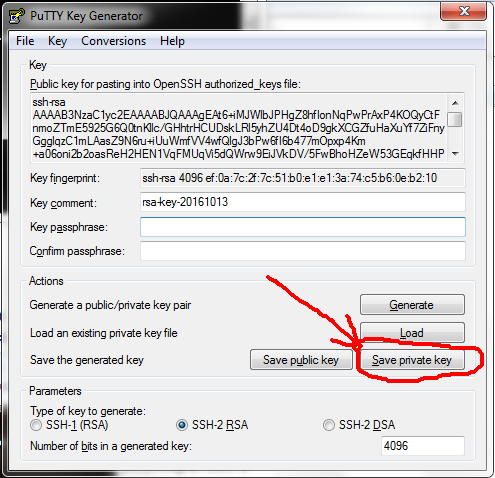Putty Generate Openssh Public Key
Posted By admin On 17.12.20
Type in the passphrase and confirm it. The passphrase is used to protect your key. You will be asked for it when you connect via SSH. Click 'Save private key' to save your private key. Click 'Save public key' to save your public key. For more information on how to load the key and connect via SSH using PuTTY, please check this tutorial. May 31, 2006 configure OpenSSH on linux side to accept version 2 public-key authentication. Create public and private keys with OpenSSH on the linux side, convert OpenSSH keys to Putty format using puttygen.exe at the Window side, use putty.exe to talk to OpenSSH using the converted private key. I would assume that you have OpenSSH installed. /blockchain-wallet-private-key-generator.html.

Jul 19, 2013 Consequently, PuTTY does not have native support for reading OpenSSH's SSH-2 private key files. However, PuTTY does have a companion named PuTTYgen (an RSA and DSA key generation utility), that can convert OpenSSH private key files into PuTTY's format; allowing you to connect to your cloud server from a Windows machine, with the added security. May 05, 2019 To generate an SSH key pair on Windows using PuTTYgen perform the following steps: Start the PuTTYgen tool, by double-clicking on its.exe file or going to the Windows Start menu → PuTTY (64-bit) → PuTTYgen. For “Type of key to generate” leave the default RSA. The “Number of bits in a generated key”, 2048 is sufficient for most people.
The PuTTYgen program is part of PuTTY, an open source networking client for the Windows platform.
Putty Generate Openssh Public Key Work
- Download and install PuTTY or PuTTYgen.
To download PuTTY or PuTTYgen, go to http://www.putty.org/ and click the You can download PuTTY here link.
- Run the PuTTYgen program.
- Set the Type of key to generate option to SSH-2 RSA.
- In the Number of bits in a generated key box, enter 2048.
- Click Generate to generate a public/private key pair.
As the key is being generated, move the mouse around the blank area as directed.
- (Optional) Enter a passphrase for the private key in the Key passphrase box and reenter it in the Confirm passphrase box.
Note:
While a passphrase is not required, you should specify one as a security measure to protect the private key from unauthorized use. When you specify a passphrase, a user must enter the passphrase every time the private key is used.
- Click Save private key to save the private key to a file. To adhere to file-naming conventions, you should give the private key file an extension of
.ppk(PuTTY private key).Note:
The.ppkfile extension indicates that the private key is in PuTTY's proprietary format. You must use a key of this format when using PuTTY as your SSH client. It cannot be used with other SSH client tools. Refer to the PuTTY documentation to convert a private key in this format to a different format. - Select all of the characters in the Public key for pasting into OpenSSH authorized_keys file box.
Make sure you select all the characters, not just the ones you can see in the narrow window. If a scroll bar is next to the characters, you aren't seeing all the characters.
- Right-click somewhere in the selected text and select Copy from the menu.
- Open a text editor and paste the characters, just as you copied them. Start at the first character in the text editor, and do not insert any line breaks.
- Save the text file in the same folder where you saved the private key, using the
.pubextension to indicate that the file contains a public key. - If you or others are going to use an SSH client that requires the OpenSSH format for private keys (such as the
sshutility on Linux), export the private key:- On the Conversions menu, choose Export OpenSSH key.
- Save the private key in OpenSSH format in the same folder where you saved the private key in
.ppkformat, using an extension such as.opensshto indicate the file's content.